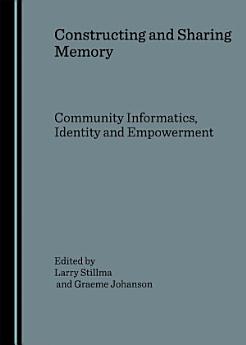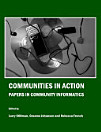Constructing and Sharing Memory: Community Informatics, Identity and Empowerment
About this ebook
The volume brings together international perspectives around defining and debating the idea of community memory which, as Alex Byrne, President of the International Federation of Library Associations and Institutions observed in his splendid and wide-ranging Introduction: "community memories are multilayered, changeable, conflicting and contested", and the multilayering, changeability and contest between different players provide fertile theoretical and practical ground for Community Informatics and its interdisciplinary cousins.
"Community Informatics is an emerging new multi-disciplinary approach to the study of the intersection of communities and Information and Communication Technologies. This volume contains significant contributions from international practitioners and researchers in the fields of archives, record-keeping, community knowledge management, emerging information and communication technologies, history, community development-virtual as well as real-and Community Informatics as a
growing discipline. The content of the book is a unique contribution in the field. The volume will be read by researchers, and communities interested in how they communicate their past, present, and future."
—Professor Emerita Gunilla Bradley Informatics School of ICT Royal Institute of Technology (KTH) Stockholm Sweden
"Practitioners, researchers and theoreticians in Community Informatics will find a unique array of valuable perspectives in this book. It covers the interaction of communities, memories and technologies in a highly original way, with regard to its breadth and the number of case studies it presents. It incorporates contributions from 13 countries in all parts of our endangered planet, thus providing the international perspective that is critical to understanding how communities can use technology for societal good."
—Professor Michel Menou. Les Rosiers sur Loire, France, Associate, Centre for Information Behaviour and the Evaluation of Research, University College London, London, United Kingdom
About the author
Associate Professor Graeme Johanson is Director of the Centre for Community Networking Research (www.ccnr.net), Monash University, Australia. The Centre implements projects with practitioners in Australia and internationally, and its members also contribute to the growing body of research in Community Informatics. Projects relate to communities and community organisations and their interaction with
information and communication technologies, including projects on socio-technical change in the non-profit sector, corporate social responsibility, e-government, trust in technology and minority communities and research e-repositories. The Centre is also engaged in policy development at a local and international level.




